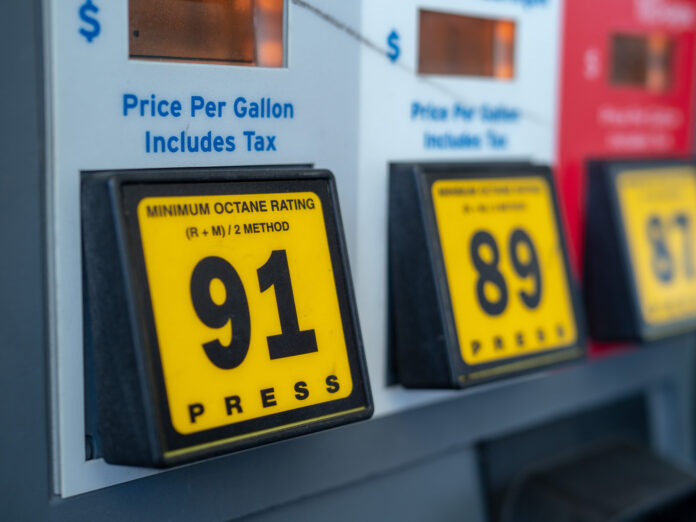Massachusetts lawmakers are considering levying additional gas taxes on the local level with House Bill 3039. If passed, the bill would allow any city or town to impose a local excise tax on the sale of fuel and special fuels to retail dealers. This would be in addition to the state’s current 24-cent-per-gallon tax on fuel.
Politically Dedicated Spending
According to HB 3039, any city or town that imposes this local excise tax shall first establish a Municipal Fuel Excise Transportation and Stormwater Fund prior to levying the additional excise tax. This fund would be divided into three spending areas. The first being for the purposes of maintenance, upkeep, and construction of roads, bridges, sidewalks, and public parking areas, or roadside drainage. The second being for the Massachusetts Bay Transportation Authority or regional transportation authority serving the city or town. The third being for projects that promote and improve non-single occupancy motor vehicle transportation, such as pedestrian and bicycle facilities, as well as carpool programs.
Like all taxes, this local excise tax would be borne by consumers, who would pay more for gas at a time when gas prices are skyrocketing around the nation.
‘Unreliable’ Funding Source
Historically, gasoline taxes have been inherently unreliable sources of funding when it comes to state roads, maintenance, and other transportation infrastructure projects. This is partly attributable to the rise of more fuel-efficient vehicles.
According to The Electric Vehicle World Sales Database, sales of electric vehicles have been consistently increasing since 2011. Furthermore, if states begin to follow in the footsteps of California Gov. Gavin Newsom, we are likely to see a phasing-out of the sale of gasoline-powered cars in the years to come.
In 2015, Daniel Vock, writing for Governing, examined state gasoline tax data reported to the U.S. Census Bureau and discovered two-thirds of state-imposed fuel taxes failed to keep state transportation budgets afloat amid inflation. Moreover, the coronavirus pandemic has added an unforeseen layer to the complexities and shortcomings of using gasoline taxes to subsidize state-run transportation programs and projects.
The stark decline in driving that accompanied lockdown orders drastically reduced gasoline tax revenue for state and local governments, highlighting the fact that gas taxes are no longer viable sources for state infrastructure and transportation funding. According to the American Road and Transportation Builders Association, more than $8.5 billion in planned projects across 14 states were canceled or delayed because of budgetary shortcomings due to COVID-19.
Regressive Taxes
Additionally, fuel taxes are highly regressive and carry with them a myriad of economic consequences, including creating new direct-to-consumer costs.
As a function of corporate finance, large-scale corporations and transit entities will see their usual budget allocation for fuel fall short with increasing prices, thus higher prices on goods and services will be the result.
As is the case with many top-down taxes, an increase in gasoline taxes will hit small business owners harder at a time when small businesses do not need any more hurdles. According to Wallethub, 87 percent of small business owners are struggling due to the ongoing pandemic.
A Maryland Public Policy Institute study, by Wendell Cox and Ronald Utt, argues gas taxes have a significantly greater negative effect on the budget of lower- and middle-income families than they do for wealthier households. Gasoline consumption is inelastic for most Americans, meaning those who are already marginally able to pay their bills face an increased financial burden due to an increase in fuel taxes.
Moreover, the revenue from fuel taxes is not always allocated to transportation upgrades. The latest example of this took place in Pennsylvania, where gas tax revenue intended to fund bridge repairs went to the state police instead. The Keystone State saw $802 million in gas tax revenue allocated toward police funding. While police funding is paramount to a safe society, there is no way for constituents to be sure that gas tax funding goes towards the betterment of state transportation infrastructure.
Furthermore, as more electric and fuel-efficient vehicles enter the market, policymakers must consider more modern and effective ways to fund road construction and other state transportation infrastructure projects. Such is why many states have turned to privatizing roads and establishing toll systems as ways to improve their roadways.
Overall, as lawmakers in Massachusetts consider HB 3039, they should avoid relying upon ultimately unreliable gas tax increases and craft legislation and policies that would provide more effective infrastructure funding in the years to come.
Samantha Fillmore (sfillmore@heartland.org) is a government relations manager with The Heartland Institute.
Internet Info
Raising Gas Taxes Won’t Fix Our Bridges
https://www.heartland.org/publications-resources/publications/raising-gas-taxes–wont-fix-our-bridges
In this paper, Adrian Moore of the Reason Foundation argues increasing fuel taxes should not be the only response to state transportation funding problems. Moore wrote, “First we must examine how we spend transportation dollars now. Then we maximize the value out of those dollars. Finally, the last step is to address the need for additional revenue.”
Paying at the Pump: Gasoline Taxes in America
http://taxfoundation.org/article/paying-pump-gasoline-taxes-america
In this paper from the Tax Foundation, Jonathan Williams argues gas taxes can be an effective means of funding transportation improvements. In many cases, however, governments exploit the taxes for political reasons, spending them on projects unrelated to roads and other transportation projects.
Alternatives to the Motor Fuel Tax
https://www.heartland.org/publications-resources/publications/alternatives-to-the-motor-fuel-tax
This report, prepared by the Center for Urban Studies at Portland State University and submitted to the Oregon Department of Transportation, evaluates potential alternatives to motor-fuel taxes. The report also identifies the economic and technological problems that must be addressed when designing alternative revenue sources.
State Motor Fuel Taxes
https://www.api.org/oil-and-natural-gas/consumer-information/motor-fuel-taxes/gasoline-tax
The American Petroleum Institute documents each state’s current motor-fuel taxes (both gasoline and diesel).
Policy Tip Sheet: Gas Taxes are not the Long-Term Solution to Funding Transportation
https://www.heartland.org/publications-resources/publications/policy-tip-sheet-gas-taxes-are-not-the-long-term-solution-to-funding-transportation1?source=policybot
In this Policy Tip Sheet, Matthew Glans examines gasoline taxes, how they have become less effective over time, and why states can no longer rely on them to fund state transportation projects.


























